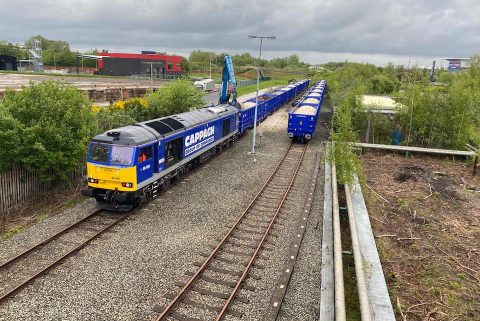Rail success vital to Port of Hamburg’s global strength

Rail freight links to and from the Port of Hamburg have been instrumental in ensuring Austria remains its most important trading partner in containerised shipping. Almost all – 98 per cent – container transports between the two are handled by rail, with some 296,000 TEUs shifted last year.
Overall, around 42 per cent of Austrian cargo volumes are handled through services via Hamburg. The key contributory factors are its excellent rail links, incorporating the frequency of daily container block train departures, as well as the port’s high number of direct worldwide liner services.
The situation mirrors that of Hamburg’s relationship with China, and the potential for expanding rail services to and from the Far East, an issue which was explored at a high-level event attended by international rail freight stakeholders keen on exploiting the opportunities.
Advantage
Alexander Till, Manager of the port’s Vienna office, said he was convinced that the successful Austrian trading trend would continue this year, and added: “At a time when ecological footprint per container is of growing importance, this gives the Port of Hamburg a crucial competitive advantage. Following many discussions with Austrian decision-makers in the first quarter, one may say that 2017 too will again be a successful year for the Port of Hamburg in Austria.
‘Its central geographical location makes the Austrian market hotly contested among several European ports. In recent years, the Southern ports, especially, have managed to increase their market shares. Even in this challenging market environment, the Port of Hamburg has invariably proved able to defend its dominant role.”
Campaign
Much of the success is put down to a highly successful marketing campaign staged by the Vienna office, reflected in the staging over the last ten years of more than 30 workshops across Austria. Hafen Hamburg Marketing (HHM) also organises regular port tours for representatives from business and politics, the latest being for a delegation from the Federation of Austrian Industry.
HHM was also behind a recent event promoting Hamburg’s status as Germany’s most important seaport for China, a status underlined by the operating of 177 trains a week between the two countries. The event, Hamburg – Gateway to the New Silk Road – was jointly organised by Hamburg Port Authority and Netzwerk Business-International.org
Silk Road
Speaking to around 70 delegates, Axel Mattern, CEO of HHM, said: “What does the Port of Hamburg have to do with freight transport by rail on the new Silk Road? The port is Europe’s biggest logistics hub and is the leading port for trade with China. Rail plays a decisive role in both incoming and outgoing port logistics. With 2,000 weekly container train services on offer, of which 177 are with China, Hamburg is by far the major player in the market place.”
Zhanguo Gao, First Secretary of the Chinese Embassy’s economic department in Berlin, Zhanguo Gao, described Hamburg as a ‘location for innovation and logistics’, adding: “Naturally the Silk Road project creates issues that have to be dealt with. Those involved can solve them jointly, bringing in their own expertise. In the final analysis, it is a matter of patience and cooperation: only time will tell.”
‘networking the world’
Uwe Leuschner, Senior Vice President of DB Cargo, added: “Both in Germany and the whole of the EU, people should recognise that the Silk Road is important. It is now, from this project that we are learning what ‘railway’ really means. That is the inter-meshing of Chinese and European networks. It is about networking the world.”
And Carsten Pottharst, Managing Director of Swiss-based InterRail Europe, said the challenge for carriers lay in organising cargo flow. “Our latest product carries containers from China to London,” he said. “The first train left Yiwu on New Year’s Eve 2016, arriving in the UK seventeen days later. In the next five years, I see the transport of all types of goods via the Silk Road.”





